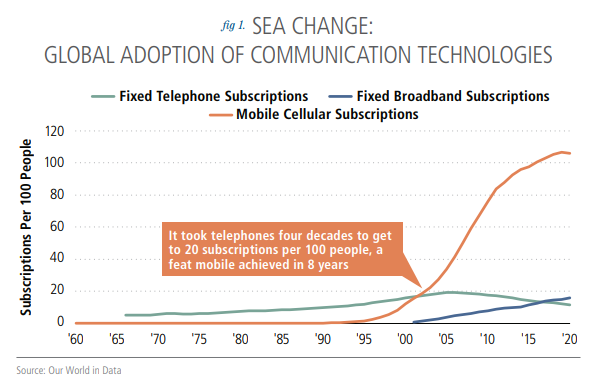Metaverse: farce or revolution?

Metaverse: Could the unimaginable disrupt the global economy? The analysis of Jeffrey Cleveland, Chief economist of Payden & Rygel.
2012 will go down in history as the year of the transition to mobile computing, destined to revolutionize the global economy for the rest of the decade (see Figure 1). Companies like Instagram , Uber, Spotify, TikTok and many others owe their entire existence to the presence of microcomputers in our pockets. Today, unlike ten years ago, most of the "computing" takes place via smartphone and Apple sells the most widespread version in the world: in just 16 years the share of US personal computers produced by the Cupertino colossus has gone from 2 % to 60%.
No one knows the future, but the transition from PC to mobile has taught us that it's worth thinking about what the next shift in computing will be. One of the possible candidates is that particular combination of augmented reality (AR), virtual reality (VR), artificial intelligence (AI) and distributed computing that together create the so-called "Metaverse".
The Metaverse, which for some is a farce, for others it could upset the entire global economy. We at Payden are inclined to support the second hypothesis, but with a twist: the candidates currently given as favorites for building the Metaverse, such as social media, may not turn out to be the winners in the test of facts.

METAVERSE? WHO IS HE?
In 1994 Neal Stephenson, in his science fiction novel Snow Crash, set in the early 21st century after the collapse of the global economy, described the Metaverse as a computer-generated universe, where people tune in to isolate themselves from a bleak reality. A sort of persistent online world, a space where people can meet digitally and in real time, wherever they are in the "physical" world, as in a massive online role-playing game (think Animal Crossing, Second Life or, for the younger ones, Fortnite Battle Royale).
Those who don't like video games may miss the sense of these virtual worlds, but as virtual rendering and computing improve (and this is inevitable), many unimaginable things will become quite common. For example, impersonal meetings via Zoom could be replaced by real virtual offices, accessible via viewers or contact lenses, which will also make it possible to read the non-verbal communication signals between colleagues. Furthermore, if reality were faithfully transposed into digital, it would be possible to recreate an exact copy of any city, rendering in real time, for example, every stop on the London underground, every cab and every blade of grass of Hyde Park. Wouldn't it be fun to be able to roam the Metaverse just like you visit Google Earth looking for interesting places?
If we then reflect for a moment on how much time we spend every day acquiring correct information and focusing on a complete picture of a given situation, in order to then modify plans and scenarios before making an important decision, the usefulness of having provides a virtual world of opportunities where you can run millions of simulations.
If this digital rendering could be extended to every stadium, hotel, shop and apartment for sale, anyone could have simultaneous access to experiences usually reserved for a few, such as races, matches, concerts or backstage, with the added advantage of being able to adjust the quality of lighting, sound and video to suit your personal preferences – the opportunities are endless, even though a realistic, fully immersive virtual world could trap many for hours if not days.
VIDEO GAME COMPANIES WILL WIN THE METAVERSE CHALLENGE
As ready as social media and video conferencing services may seem ready to face the test of the Metaverse, they may be disappointed by the strong competitive advantage that video game companies have. This is because to create a plausible rendering of reality it is necessary to have enormous computing and memory capabilities.
Our favorite example is a 1979 video game called Flight Simulator, now owned by Microsoft: it's a virtual world 2.5 petabytes in size, or 2,500,000 gigabytes, about 1,000 times larger than Fortnite. Since no consumer device can currently store that much data (most PCs cap at 1,000 gigabytes), the program still runs on CD, a technology many young people may not be familiar with. The video game aims to give a pilot experience as realistic as possible and, to render landscape, weather and trajectory, a huge amount of data and processing power are required. The Metaverse will have characteristics similar to those of this flight simulator, because it must be able to faithfully reproduce reality.
Why we believe the Metaverse will have a huge impact on the economy and financial markets was summed up by Jensen Huang, CEO and founder of semiconductor and computer giant Nvidia, who says “the economy in the Metaverse will be bigger of the economy of the physical world”, although, to date, what consumers spend online is still only a small fraction (12%) of their total spending. But what if, one day, you spend more time and money online than in the real world?
LET A THOUSAND WORLDS FLOWER
The era of the Metaverse will require joint time and effort. The evolution of mobile computing is a great case study: Mobile internet has been around since 1991, but it's only since around 2010 that internet speeds and bandwidth, hardware devices and software applications have made it possible for every person on the planet to have a smartphone , giving rise to a huge market.
The same goes for the birth of the Metaverse, which requires three fundamental economic principles:
The interoperability of various online meeting places, with the possibility of acquiring and transferring property rights: for example, if you buy a Manchester United shirt to put on your avatar to watch a match, the same shirt must be able to wear also on other occasions, for example in Fortnite or during a Zoom meeting. Property rights matter, because you're less likely to buy clothing or digital items if you can't take them with you.
Expansion of Computing and Storage Power: True-to-life, high-speed, low-latency reality rendering of images and sound requires massive computing and storage power, across graphics processing units (GPUs), data centers, and high-performance chips. speed.
The support of artificial intelligence: it is probable that in the Metaverse we will interact not only with human beings, but above all with artificial intelligences, whose development is really fast (just think of ChatGPT, the artificial intelligence chatbot produced by OpenAI, which represents the fastest-adopted technology in computing history, with over 100 million active users after just two months).
Since many technologies only make sense when there is a world in which they can be applied, the Metaverse could finally make sense of technologies such as virtual reality, augmented reality, artificial intelligence and cryptocurrencies. We are still in a nascent phase of the Metaverse, but this is good because it means that today it is impossible to even imagine all its potential and unimaginable surprises could await us in the next decade.
This is a machine translation from Italian language of a post published on Start Magazine at the URL https://www.startmag.it/innovazione/metaverso-farsa-o-rivoluzione/ on Sun, 02 Jul 2023 05:48:54 +0000.
